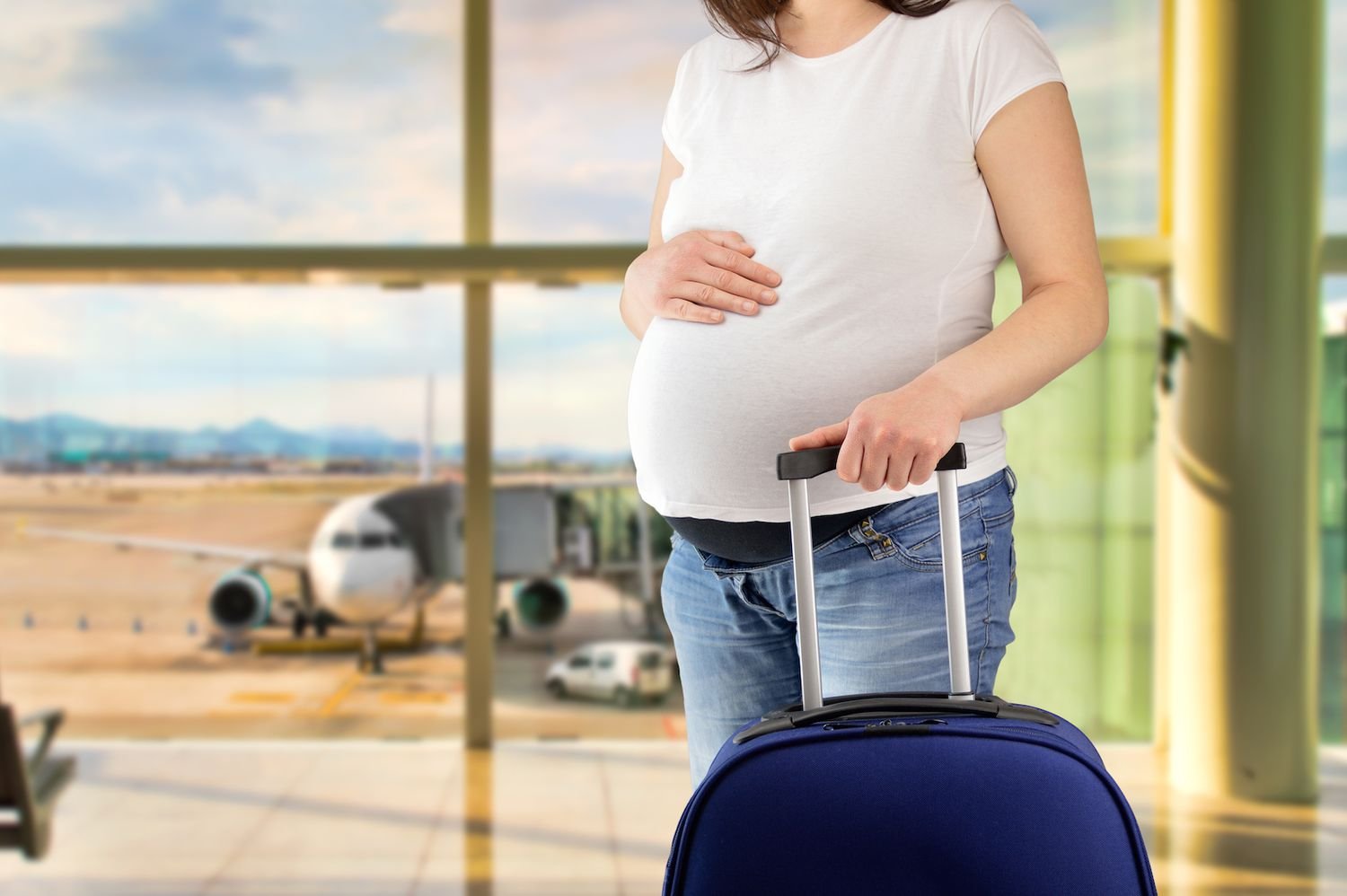
Planning a trip during pregnancy can be an exciting yet delicate task. As an expectant mother, it's important to prioritize your health and well-being, while also ensuring a memorable travel experience. But with so many factors to consider, such as safety, comfort, and the stage of pregnancy, choosing the optimal month for your trip can feel overwhelming.
That's where we come in. In this guide, we will provide you with valuable insights and expert advice on selecting the perfect month for a safe and unforgettable journey. Whether you're dreaming of a relaxing beach vacation or an adventurous city escape, we'll cover everything you need to know, including the best time to travel during each trimester, precautions to take, and must-have essentials for a stress-free trip. So, let's embark on this journey together and discover how to make the most out of your pregnancy travel experience.
Traveling during pregnancy - is it safe?
Many expectant mothers wonder if it's safe to travel during pregnancy. The answer is yes, it can be safe to travel as long as you take certain precautions and consult with your healthcare provider. However, it's important to keep in mind that every pregnancy is different, and what may be safe for one woman may not be for another. It's crucial to listen to your body and prioritize your health and comfort above all else.
When deciding whether to travel during pregnancy, it's essential to consider any underlying medical conditions or complications that may affect your ability to travel. It's recommended to discuss your travel plans with your healthcare provider, who can provide personalized advice based on your specific situation. Additionally, it's important to research the destination you plan to visit and be aware of any potential health risks or travel advisories that may affect pregnant women.
When it comes to choosing the optimal month for travel during pregnancy, there are several factors to consider. The stage of pregnancy plays a significant role in determining the best time to travel. Generally, the second trimester, between weeks 14 and 28, is considered the safest and most comfortable time to travel. During this trimester, morning sickness typically subsides, and the risk of miscarriage decreases. Additionally, you'll have more energy and mobility compared to the first and third trimesters.
Another factor to consider is the climate of your destination. Extreme temperatures, whether hot or cold, can be challenging to handle during pregnancy. It's important to choose a destination with a moderate climate and take appropriate measures to stay comfortable. Additionally, consider the availability of medical facilities and resources at your destination. It's crucial to have access to quality healthcare in case of any unforeseen circumstances.
First trimester travel - pros and cons:-
Traveling during the first trimester of pregnancy can be a mixed experience. On one hand, you may still be experiencing morning sickness and fatigue, which can make travel uncomfortable. On the other hand, this trimester is generally considered safe for travel, as long as you take necessary precautions.
One advantage of traveling during the first trimester is that it's typically easier to secure travel insurance, as you're less likely to have any pregnancy-related complications at this stage. Additionally, the risk of preterm labor is lower during the first trimester, which can provide peace of mind while traveling.
However, it's important to be aware of the potential challenges and discomforts that may arise during this trimester. Morning sickness and fatigue may make it difficult to fully enjoy your trip, and you may need to make frequent stops or take breaks to rest. It's crucial to listen to your body and prioritize self-care during this time.
Second trimester travel - pros and cons:-
The second trimester is often considered the ideal time for travel during pregnancy. By this stage, morning sickness has usually subsided, and you'll likely have more energy and feel more comfortable overall. This trimester is known as the "honeymoon phase" of pregnancy, as many women experience a boost in energy and a decrease in common pregnancy discomforts.
One advantage of traveling during the second trimester is that you'll have a more visible baby bump, which can lead to extra care and attention from others. This can come in handy, especially when navigating crowded airports or public transportation.
However, it's essential to keep in mind that every pregnancy is different, and some women may still experience discomfort during the second trimester. It's important to listen to your body and make necessary adjustments to your travel plans. Additionally, it's crucial to stay hydrated, take frequent breaks, and avoid overexertion.
Third trimester travel - pros and cons:-
Traveling during the third trimester of pregnancy requires extra caution and careful planning. As your due date approaches, it's important to prioritize your comfort and safety above all else. It's generally recommended to avoid traveling during the final month of pregnancy, as the risk of preterm labor increases.
One advantage of traveling during the third trimester is that you'll have a stronger connection with your baby, and it can be a special time to bond before their arrival. Additionally, some airlines and hotels offer special accommodations for pregnant women, such as priority boarding or extra legroom.
However, it's crucial to be aware of the potential challenges and risks associated with third-trimester travel. Fatigue and discomfort may be heightened during this time, and you may need to make frequent stops or take breaks to rest. It's important to consult with your healthcare provider before traveling and ensure you have access to quality healthcare at your destination.
Tips for a safe and comfortable trip during pregnancy:-
Regardless of the trimester you choose to travel during, there are several tips and precautions you can take to ensure a safe and comfortable trip:
1. Stay hydrated: Drink plenty of water throughout your journey to stay hydrated and prevent dehydration, which can lead to fatigue and other discomforts.
2. Pack comfortable clothing and shoes: Opt for loose-fitting and breathable clothing that allows for easy movement. Comfortable shoes are essential, especially if you'll be doing a lot of walking or exploring.
3. Take frequent breaks: Listen to your body and take breaks as needed. This will help prevent fatigue and allow you to rest and recharge.
4. Avoid overexertion: Pace yourself and avoid overexertion. It's important to conserve your energy and prioritize self-care.
5. Pack healthy snacks: Carry nutritious snacks with you to keep your energy levels up and avoid relying on unhealthy airport or hotel food.
6. Practice good hygiene: Wash your hands frequently and carry hand sanitizer to prevent the spread of germs and reduce the risk of infection.
7. Wear compression socks: If you're traveling by air or sitting for long periods, wearing compression socks can help improve blood circulation and prevent swelling.

Here are some tips to help you navigate unexpected situations during travel:
Planning your itinerary and accommodations
When planning your itinerary and accommodations, it's important to consider your specific needs as a pregnant traveler. Here are a few tips to keep in mind:
1. Choose a destination with quality healthcare facilities: Research the availability of medical facilities and resources at your destination. It's important to have access to quality healthcare in case of any unforeseen circumstances.
2. Opt for direct flights and shorter travel times: Minimize travel time and avoid long layovers to reduce stress and discomfort. Direct flights are often more convenient and less tiring, especially during pregnancy. To avoid inconvenience and to get tickets at an affordable price, book tickets through MakeMyTrip coupons.
3. Prioritize comfort in accommodations: Choose accommodations that prioritize comfort and convenience. Look for hotels with amenities such as elevators, comfortable beds, and easy access to restaurants and shops.
4. Consider activities and attractions suitable for pregnant women: Research and plan activities that are pregnancy-friendly, such as gentle walks, prenatal yoga classes, or spa treatments. Avoid activities that may pose a risk to your health or the health of your baby.
Packing essentials for a pregnancy trip-:
When it comes to packing for a pregnancy trip, it's important to be prepared and ensure you have all the essentials. Here's a checklist to help you pack:
1. Maternity clothes: Pack comfortable and loose-fitting maternity clothes that allow for easy movement.
2. Comfortable shoes: Bring a pair of comfortable shoes that provide support and cushioning.
3. Prescription medications: If you're taking any prescription medications, ensure you have an ample supply for the duration of your trip.
4. Prenatal vitamins: Don't forget to pack your prenatal vitamins to ensure you're getting the necessary nutrients for you and your baby.
5. Snacks: Carry healthy snacks with you to keep your energy levels up throughout the day.
6. Travel insurance documents: Make sure to have a copy of your travel insurance documents and emergency contact numbers.
7. Medical records and healthcare provider's contact information: Bring a copy of your medical records and have your healthcare provider's contact information easily accessible.
8. Comfort items: Pack items that provide comfort and relaxation, such as a pregnancy pillow or a favorite book.
9. Compression socks: Don't forget to pack compression socks to improve blood circulation and prevent swelling during travel.
Preparing for All situations during travel
While it's impossible to predict every situation that may arise during travel, it's important to be prepared for the unexpected. Here are a few tips to help you navigate unexpected situations:
1. Research local medical facilities: Familiarize yourself with the location of nearby hospitals or clinics at your destination. Save their contact information in case of emergencies.
2. Purchase travel insurance: Invest in travel insurance that covers pregnancy-related complications. This will provide peace of mind and financial protection in case of any unforeseen circumstances.
3. Carry important documents with you: Keep copies of important documents, such as your passport, ID, and travel insurance, in a separate place from the originals. This will make it easier to replace them if they get lost or stolen.
4. Stay connected: Ensure you have a reliable means of communication, such as a working phone or an international SIM card. Share your travel itinerary with a trusted friend or family member who can reach out to you if needed.
5. Be flexible and adaptable: Remember that travel plans may change unexpectedly, especially during pregnancy. Stay flexible and be prepared to adjust your itinerary or travel dates if necessary.
Conclusion: Enjoying a safe and memorable trip during pregnancy
Choosing the optimal month for travel during pregnancy can be a challenging decision. By considering factors such as the stage of pregnancy, climate, and personal comfort, you can make an informed choice that prioritizes your health and well-being. Remember to consult with your healthcare provider before making any travel plans and take necessary precautions to ensure a safe and comfortable trip.
With proper planning, packing essentials, and the right mindset, you can enjoy a memorable travel experience during pregnancy. So, embrace this unique opportunity to explore the world and create lasting memories while nurturing the precious life growing within you. Safe travels!